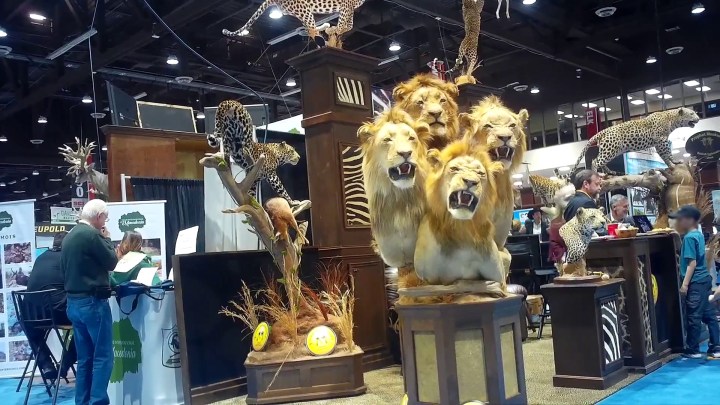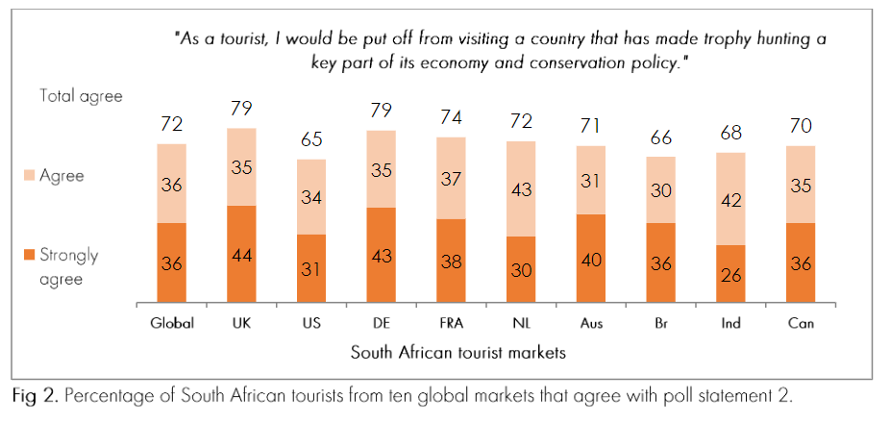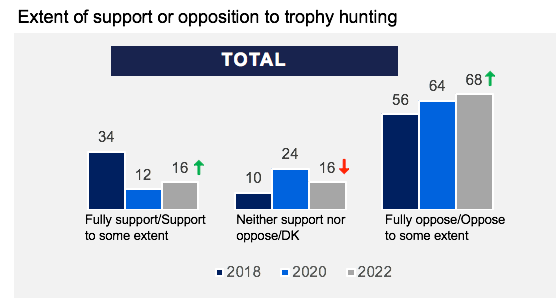BLOOD SPORT SURVEY
End trophy hunting in South Africa, or we won’t visit your country, say tourists

Trophy hunters run loud, expensive campaigns to convince the public they kill for conservation and the good of poor communities. Two recent authoritative surveys revealed that the public disagrees, and that hunting is a threat to tourism in South Africa.
Two surveys conducted this year, both within South Africa and internationally, show widespread rejection of trophy hunting. The global survey comes with a warning that hunting is damaging the country as a wildlife tourist destination.
Despite the growing opposition to trophy hunting, foreign hunters — mainly American — still stream in to shoot and kill every imaginable species of animal from squirrels, African wild cats and blue duikers to the rarest, such as Lichtenstein’s hartebeest and the largest, such as elephants and hippos. They even target endangered aardvarks.
Between 2016 and 2020, hunters killed a staggering 174,000 animals in SA.
World Animal Protection (WAP) commissioned research surveying 10,900 people from around the world, including international tourists from countries who most frequently visit South Africa, as well as South African citizens. It found universal opposition to blood sports and a strong desire to finance the protection of wildlife through non-lethal alternatives such as responsible tourism.
Key findings from the research showed:
- At least 84% of international tourists agree that the South African government should prioritise wildlife-friendly tourism over trophy hunting.
- At least 74% agreed that making trophy hunting a key pillar of policy will damage South Africa’s reputation and 72% would be put off from visiting the country altogether.
- Seven in 10 South African citizens agreed their country would be a more attractive tourist destination if trophy hunting was banned.
- Three-quarters of South African citizens agreed that trophy hunting was unacceptable when wildlife-friendly tourism alternatives have not been fully utilised.

A survey of 3,599 people by Humane Society International/Africa, conducted across all provinces, also found considerable objection to trophy hunting among all race and gender groups, six language groups and a range of ages and household incomes, both urban and rural.
Opposition to trophy hunting continued to grow from their (2020) survey, with a 4% increase in opposition to trophy hunting overall, taking opposition levels among the South African adult population to 68%.

World Animal Protection welcomed the May 2021 recommendations from South Africa’s Department of Forestry, Fisheries and the Environment (DFFE) to halt the domestication of captive lions, as well as the phasing out of the commercial captive lion industry. But it said progressive steps had seemingly stalled, with little progress taking place in the year that followed.
The HSI/Africa poll was extremely fine-grained, drilling down into views on the hunting of a number of iconic animals. The percentages of people objecting to trophy hunts were:
All trophy hunting — 68%
Canned lion hunting — 65%
Elephants — 64%
Rhinos — 64%
Leopards — 64%
Lions — 63%
Hippos — 66%
Giraffes — 67%
Objections to foreign hunters exporting trophies for elephants, black rhinos and leopards were all above 60%.
In terms of race, the highest objection to trophy hunting came from Indians (91%), followed by whites (73%), coloureds (70%) and blacks (66%). There was roughly a 50-50 parity between genders.
The survey noted that opposition to trophy hunting is more marked among the younger age group (15-17) at 79%, compared with 68% of those between 25 and 34. This trend was consistent across all results.
There were clear regional differences when it came to opposition to canned lion hunting, being lowest by far among residents of the Free State (36%), possibly because of the high level of hunting and captive breeding of wild animals in the region.
“Our new survey shows without a doubt,” said HSI/Africa wildlife specialist Dr Matthew Schurch, “that most South Africans reject the unjustifiable practice of trophy hunting, including canned lion hunting, and opposition to trophy hunting continues to grow.
SA government ‘out of step’
“The South African government is out of step with public opinion because it allows people to hunt wild animals for the purpose of collecting their remains to adorn their homes. Trophy hunting does not significantly contribute to conservation.
“In South Africa, one-third of hunting trophies of CITES-listed mammals are from captive bred animals. This senseless killing of wild animals is not only unethical and cruel, but a disgrace to brand South Africa.”
Visit Daily Maverick’s home page for more news, analysis and investigations
Commenting on the results of the World Animal Protection survey, its wildlife campaign manager, Edith Kabesiime, said it was clear the public understood that “life of a wild animal is worth so much more than the trophy it is too often reduced to”.
This view was shared by tourists, who come to see wildlife alive and thriving, as well as South Africans who “want to see the incredible wildlife on their doorstep, protected properly, in a humane and ethical manner”.
Bipolar policy
The surveys coincide with South Africa’s White Paper on animal welfare and sustainable use of biodiversity and a call for a committee to discuss the shutting down of lion farms. But in the bipolar way that environmental policy in South Africa seems to specialise, this coincided with the issue of the Environment Department’s Draft Game Meat Strategy aiming to double the consumption of meat from wildlife by 2030. This is seen as a threat to wildlife genetic health and the possibility of wildlife feedlot farming.
Dear Minister Creecy, your Game Meat Strategy puts the cart before the horse and must be delayed
According to the Professional Hunters Registers supplied by DFFE, the annual number of foreign trophy hunters entering South Africa averaged around 8,000 (apart from 2020, because of the pandemic).
Between 2016 and 2020 they shot 173,822 wild animals from 83 species. Most hunters came from the United States (4,614 in 2019); the rest, in descending order, from Denmark, Germany, Spain, Canada, Sweden, Mexico and Russia.
A sample of their trophies now mounted or hanging on walls include:
Aardvark — 21
Baboon — 1,655
Bat-eared fox — 56
Buffalo — 4,258
Dassie — 84
Gemsbok — 9,600
Giraffe — 1,340
Ground squirrel — 37
Hippo — 285
Honey badger — 194
Impala — 24,591
Jackal — 1,185
Kudu — 12,637
Lion — 1,636
Polecat — 17
Rhino — 275
Samango monkey — 29
Sable antelope — 4,885
Springbok — 10,587
Suni — 53
Vervet monkey — 913
Warthog — 17,749
Wildebeest — 12,282
Zebra — 10,223
Daily Maverick obtained a 2019 average price list per species, indicating what foreigners are prepared to pay to hunt in South Africa. Here are a few examples:
Baboon — $248
Cheetah — $5,000
Elephant — $26,500
Giraffe — $3,000
Hyena — $3,500
Leopard — $7,830
Lion — $10,000
Cape clawless otter — $100
Sable antelope — $5,414
Ground squirrel — $50
Warthog — $448
Hartman’s zebra — $2,260
Ostrich — $766
Crocodile — $5,700
Emu — $500
Camel — $500
“The government needs to listen to South African voices who clearly don’t want their wildlife heritage plundered any further and want to see change,” said Kabesiime.
“Continuing to make wild animals shoot-to-kill targets at the mercy of wealthy westerners is outdated in a world where public attitudes are swiftly shifting.”
She said that without taking a firm stand, South Africa was starving the oxygen from creative thinking to identify, incentivise and implement non-lethal alternatives to conserve wildlife.
“Wildlife has the right to a wild life free from cruel commercial exploitation. We need to respect and protect them.” DM/OBP






















 Become an Insider
Become an Insider
It’s not so black and white …. I am a vet …. I detest the act of shooting an animal for what ever reason… culling , trophy But in my extensive travels through hunting areas from SA to Ethiopia these professional hunters are the only thing preventing the complete annihilation of big and small game… the governments are in many cases the poachers …. I am open to speak to anyone about this very difficult topic but one which must be addressed and understood rationally… call me …. I’m easy to find … vet PTN JHB
You’re absolutely correct. I’m also not a hunter personally, but have managed many wildlife estates over 40 years including hunting concessions. Hunting is the only viable income stream for the overwhelming majority of private wildlife estates.
A survey of 599 people is not sufficient evidence to ban a pastime that aids conservation and brings in much-needed foreign exchange. I suspect that for most tourists, hunting is not something they think about. Prejudices should not be presented as facts.
Mr. Pinnock continues to misuse statistics to justify his views. The “World Animal Protection Survey” (the name gives a clue as to possible bias) “includes” international tourists, but it does not say how many of the 10,900 were international tourists, nor does it say how many of those come to South Africa. Nor does it say how many of those surveyed knew whether trophy hunting is practiced here. Nor does it say how many of those surveyed were South African, which is important as a purported “Three-quarters of South African citizens agreed that trophy hunting was unacceptable when wildlife-friendly tourism alternatives have not been fully utilised.” Mr. Pinnock does not venture what those tourism alternatives might be. If they existed I imagine they would already have been implemented.
The HSI/A survey is laughable. Out of a measly 599 surveyed, they managed to extrapolate percentages by race, by the animal hunted and by province! Meaningless, but taken by Mr. Pinnock as proving the correctness of his views. “Our new survey shows WITHOUT A DOUBT that most South Africans reject the unjustifiable practice of trophy hunting” On 599 people surveyed?
“Between 2016 and 2020, hunters killed a staggering 174,000 animals in SA” Which is 43,500 a year. Not very many if you include biltong hunters. In 2016 3.8 million cattle were slaughtered in South Africa.
Foreign hunters make a huge contibution to the economy and conservation, which should not be put in jeopardy by biased reporting.
Totally agree with you. Poor journalism and not providing for the opposing view point because it’s not fashionable. Totally biased reporting and manipulation of data.
During my 40 years in conservation I have worked in and managed multitudes of wildlife entities – National Parks, tourist lodges, game farms, hunting concessions, ecotourism venues, multiple-use biosphere reserves.
Personally I’m not a hunter, and derive no pleasure from it. Paradoxically in my work I have shot many animals during culling, cropping, ration shooting, euthanasia etc.
I think I’m qualified to offer an opinion about how wildlife/conservation areas are best managed.
The majority of wildlife estates have neither exceptional wildlife, nor outstanding aesthetic value, nor accessibility to local, national or international clientele. They are mostly marginal/historically downgraded lands which can’t viably support domestic stock or agriculture. They are subject to a number of expensive management requirements. Very few of them can cover these costs through ecotourism for the above mentioned reasons and rely on external funding and/or hunting to be viable.
So what do you do with the animals that breed with no natural predation? At some stage you have to remove animals before their sheer numbers cause issues within their own populations and have major impact on other species, biodiversity and veld condition. Capture and sell? Invariably the purchasers are hunting farms who then make money from hunting them. It’s the nature of the industry. And it works. Otherwise there wouldn’t be such extensive wildlife habitat in Southern Africa which is my terms of reference.
The HSI survey was with 3 559 people, which is a creditable survey number. It was an error in printing which I asked to be rectified the day the story came out but for some reason Maverick did not do this but now has.
Just a question I need to ask, given that you seem to think the information is coming from me and my personal bias: Should surveys of this kind not be reported because they do not agree with your viewpoint (I am replying not just to Nick, who makes some very good points)?
Even 3,599 is not a great sample. When the survey is carried out by the “Humane Society” one has to wonder about their impartiality. I have no worries about Mr. Pinnocks impartiality, he is rabidly against any sort of hunting.
Well put and informative Nick. This is a very emotionally driven subject. Botswana banned hunting a few years ago to the huge detriment of the local economy and has since rethought and rescinded the ban. I personally believe trophy hunters are despicable (particularly hunting of any canned animal) but understand the economics and necessity of culling.